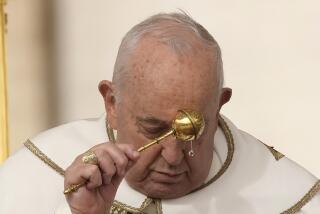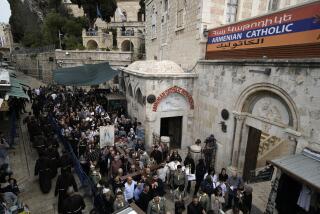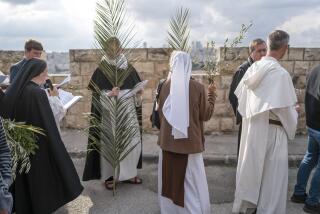Syria’s Assad pays visit to recaptured Christian town on Easter
DAMASCUS, Syria – President Bashar Assad made a symbolic Easter visit Sunday to the heavily damaged town of Maaloula, a Christian landmark enclave recaptured from Islamist rebels last week by government forces.
The president’s visit, broadcast on state television, underscored his efforts to portray himself as a defender of Christians and other minorities as he prepares for an expected reelection bid in the midst of a devastating war now in its fourth year.
Maaloula and several of its historic churches sustained significant damage during heavy fighting and bombardment. Church leaders say priceless icons were looted or destroyed during the rebel occupation of Maaloula, famous for its preservation of Aramaic, a version of the language spoken by Jesus Christ.
“No one, no matter the extent of their terrorism, is able to erase our human and cultural history,” Assad declared in Maaloula while in the company of senior Christian clerics. “Maaloula will remain steadfast ... in the face of the barbarity and darkness of all who target the homeland.”
Opposition groups seeking Assad’s ouster generally dismissed the trip as a stunt or faked. The exile-based Syrian National Coalition sent Easter greetings to Syria’s Christians “at a time when Assad destroyed the country because of a people who are demanding freedom.”
The trip provided the opportunity for some electioneering in advance of presidential balloting that is expected to take place in June, though no date has been formally set. Although Assad has not announced his candidacy, he has hinted he will seek a third seven-year term.
Damascus, the capital, has taken on a vaguely preelection atmosphere. Storefronts have been freshly painted with the national colors, and walls feature ubiquitous posters depicting Assad in both military and civilian garb.
The capital is under firm government control. But several nearby suburbs occupied by rebels have become launching pads for often deadly mortar strikes into central Damascus, including an attack Sunday that killed a family of three, authorities said.
State news media broadcast images of the president examining damage to Maaloula and visiting the battered Monastery of Sts. Sergius and Bacchus, which houses one of the world’s oldest churches, dating to the 4th century. The small church is now rubble-strewn and largely destroyed, its wooden pews shredded, a marble-altar piece split in half and a gaping hole in its dome, apparently from shelling.
The president held in his hands the remains of what appeared to be a religious painting that apparently once graced the walls.
Later, an animated Assad was pictured pressing the flesh with seemingly ecstatic citizens in a nearby village.
The president is seldom seen in public, especially outside Damascus. His foray into Maaloula, amid heavy security, appeared to thrill Syria’s Christian minority. Many Christians, like other minorities, express fears that they would face persecution or expulsion should Islamist rebels succeed in overthrowing Assad and jettisoning the nation’s secular character and tradition of moderate Islam.
“I think it’s great that the president went to Maaloula; it shows he cares about us,” said Christina Tumeh, one of many Christians taking Easter Sunday strolls in the capital’s Bab Sharqi district, where Roman-era columns line some narrow Old City streets.
The president’s visit to Maaloula comes as his forces have been making steady gains in the battlefield and are waging a fierce campaign in Homs to recapture the Old City, much of which has been in rebel hands for more than two years. The battle for Old Homs has featured army artillery and airstrikes, and the government says the rebels have attacked with mortar shells and car bombs that have left dozens of civilians dead or wounded.
In his Easter message from Rome, Pope Francis declared that it was time for all sides in the Syrian conflict to “boldly negotiate the peace long awaited and long overdue.”
The war has killed more than 100,000 people, driven millions from their homes and left much of the country in ruins.
Twitter: @mcdneville
Special correspondent Bulos reported from Beirut.
More to Read
Start your day right
Sign up for Essential California for news, features and recommendations from the L.A. Times and beyond in your inbox six days a week.
You may occasionally receive promotional content from the Los Angeles Times.







